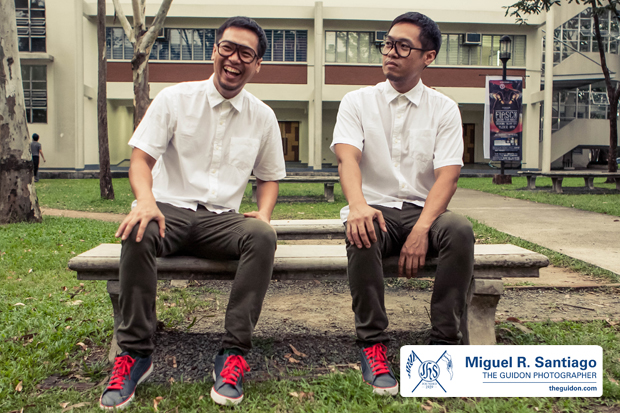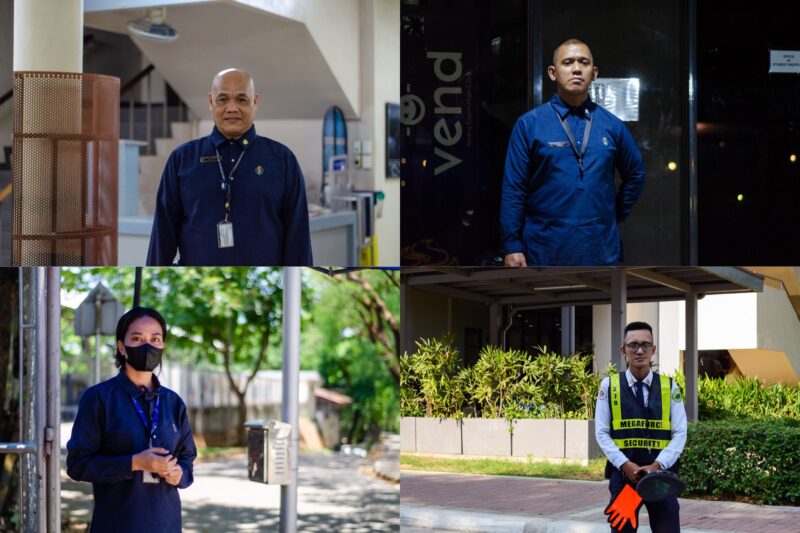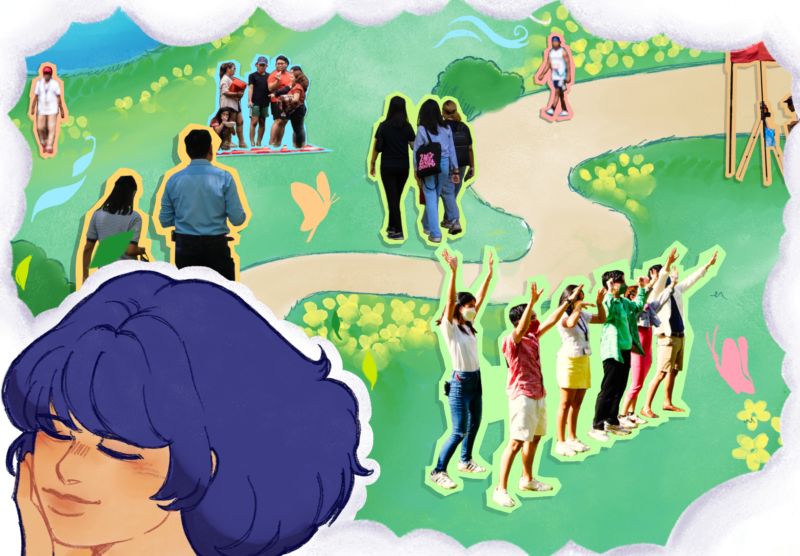
BEYOND THE STEREOTYPE. Jope Guevara is not your usual philosophy professor. Photo by Miguel R. Santiago.
“Mas mahirap bang maiwan o maghintay? (Is it harder to be left or to wait?)”
A question like this might catch someone off guard, but Geoffrey “Jope” Guevara (AB Pre-Div ‘99) replied promptly. “Kapag naghihintay ka, ibig sabihin iniwan ka, diba? (If you re waiting, doesn’t that mean you were left?)”
He gave the question a second look. “It’s hard to wait because you’re expecting something, and you’re awaiting its arrival at a certain time,” he says in Filipino. Not fond of stasis himself, he often ends up on the move in more ways than one.
In truth, Guevara is like a mosaic of perspectives. Many students have claimed him to be life-changing despite his complex sides. “Weird enough, he’s like everything rolled into one: friend, father-figure, guidance counselor, philosophy professor, mentor,” Jayvee Fulgencio, a legal management senior, shares.
His dynamism defines him. He hates waiting, avoids having favorites and wades into the unknown without expecting. This can be seen in his day-to-day actions like cooking and teaching. However, this is even more apparent in his personal story, starting from his once-upon-a-time desire to become a priest.
Set in stone
Dreams, inevitably, change with the dreamer. For many years, Guevara was bent on becoming part of the clergy. His religious upbringing even led to him to start a charismatic youth group in high school. “Feel na feel ko talaga ‘yun dati. Wala na akong ibang inisip kundi mag-pari. (Back then, I really felt that was for me. I thought of nothing else but becoming a priest.),” says Guevara.
He admits being excessively rigid as an undergraduate. “I destroyed people,” he confesses, regarding the severity of his mindset then. If something went against what a personal authority figure said, he would disregard it completely. It was as if the path to the future was set in stone, as unbendable as his will was.
Despite this, serendipity managed to slip its way through. Though he hadn’t had his eye set on teaching in the Ateneo, he decided to open this door after the Jesuit Volunteer Program (JVP)—an organization of volunteers working towards social development for the rural poor—became the pivotal point of his life.
In the program, he was exposed to different people and perspectives, most of which made him reevaluate his own central philosophies. Everything changed when he realized that there is no singular way in life.
“I was so idealistic then: This is life. This is what it’s like to be human. Yet, [the people I interacted with] didn’t know this, but they were still so happy,” Guevara explains in Filipino.
It was illumination for him. There were other concrete paths to happiness and finding himself, not just priesthood. He took the opportunity to teach, and the rest, they say, is history.
Breaking away
At times, Guevara is a porn star. Or, at least, that’s what he says. “I tell my students I’m a porn star, a gigolo, a prostitute. I say that because I cannot be that person. I want to tell myself, ‘Can you stop thinking and planning for a moment?’” Guevara says in a mix of English and Filipino.
Beneath his candid disposition is a conscious effort to break away from his opposing sides. In this regard, he attempts to “live dangerously,” following the words of the German philosopher, Friedrich Nietzsche. Guevara desires to become exactly what he can’t be—a seeming antithesis of being, an ambivalence between what is and what cannot be.
He struggles with his past inflexibility in a radical manner: a seemingly flippant dismissal of rigidity altogether. This is seen in the polar spectrum of his persona, from one extreme to another.
This search for the new is apparent in how much he dislikes stasis. “Madali akong magsawa. Maarte nga ako eh. (I get sated easily. I’m very picky.),” Guevara shares. He is often seen sporting trendy, polished attire, a testament to his attitude towards newness. He veers away from repetition, whether it’s of the dishes he cooks at home or the clothes he wears.
Be it through his thinking or his actions, Guevara’s persistence shows through. He believes in exerting complete effort. “I like to believe I’m passionate about life and with life.”
For him, this can only bear fruit, exhaustion notwithstanding. “If it’s coming from love, I don’t think you’ll get tired of being passionate, of being OA about life, [and] of being maarte,” says Guevara.
On becoming
Although things don’t always work out the way they are planned, Guevara has solid hopes for the future. In line with this is his perpetual journey of “finding himself,” despite the radical changes. He consistently finds room for improvement, be it in cooking or in being a good husband.
He’s always trying to expand his cooking repertoire. His meticulousness translates into making kare-kare from scratch, home-ground peanuts and all. “[You need to be] continuously improving, continuously looking for new recipes,” says Guevara. He is particular about everything, right down to the plating of the food.
Guevara’s determination allows him to reach toward the future. The tattoo on his arm serves as a reminder of a personal goal, though he hesitates to reveal exactly what that is. “Hangga’t di ko siya nagagawa, siguro hindi ko pwedeng sabihin. ‘Pag nalaman mo, papatayin kita, (As long as I haven’t achieved the goal, I can’t tell you what it means. If you find out, I’ll kill you.),” he jokes.
More than his personal growth, though, Guevara holds on to the yearning for a better country. He envisions the Philippines to be on the level of our more developed Asian neighbors. During a trip to Korea, he noted that a major difference was in the passion of the locals. He wished the same for us. “Hopefully that would be normal. We’re too sad and tragic.”
Beyond the now
The events that have shaped his past life still echo through the hope he harnesses to find himself. This overflows into the fundamental drive behind his teaching: to help students discover who they really are.
But unlike his past life, Guevara isn’t imposing. In teaching, he finds delight in the fact that the students themselves eventually decide which philosophy to live by. “He’s very dedicated to the work of a teacher. He’s a teacher through and through,” says Dennis Temporal, a colleague at the Philosophy Department.
More than being a welcoming teacher, Guevara is also known for his witty approach to philosophy, pop culture and personal experience. “Only Sir Jope could connect a rant about Charice Pempengco to a lesson on meron and logos—and make it work,” recalls AJ Elicaño, a creative writing senior.
This attitude doesn’t end with teaching. Guevara pushes the limits of conscious thought with his doctorate study. “What’s keeping us from enjoying life?” he aims to ask with his dissertation. His leave will be dedicated to writing this requirement for the title of PhD. Through this, he digs deeper into religion and philosophy in an attempt to grapple with the bigger questions of our times.
There are numerous conundrums hidden in the depths of our humanity, each waiting to be unraveled by experiences of change. Guevara has already had a panoramic venture between expectations and reality, and in truth, he’s still in the process as much as anyone else. But he’s willing to share what he knows, and that much he has been doing.
Parting paradoxes
Guevara isn’t exactly an enigma, but he can be enigmatic in different aspects. On one side is this serious teacher and his responsibilities; on the other is a man free of limitations.
At the heart of his contradictory nature lies a fervent passion for life and laughter. “You have to be light about things. There’s no one way.” Having realized the dangers of rigidity, Guevara sees open-mindedness as integral to growth.
His quirks and vehemence place him a step above the ordinary man, yet students get to relate with him effortlessly. Perhaps, it is something they all can identify with, too: the paradox of being and challenging that very being—the presence of an antithesis within each of us.
While doors may close to introduce new chapters, Guevara still chooses to be open to the schemes of fate. He has learned to live and laugh with his situation. With this attitude, the surprises can only keep getting better.
He says, “Kung wala kang inaasahan, kapag dumating, nakakatuwa. Nakakatawa. (If you’re not expecting anything, when something finally arrives, you’ll find yourself happy. You’ll find yourself laughing.)”






